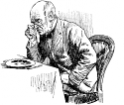Wemble
“How are you?” is another real puzzler.
Dear Word Detective: I’m a wembler. I wemble. I’m wembley. I use the word occasionally to describe myself. I can’t always make a firm decision. My husband insists that this word “wemble” came from a Fraggle Rock character who was very indecisive. I thought that the character was named, as such, for the word. I don’t remember where I first heard it, so I just thought it was a regular word. But there’s no mention of it in the dictionary. Where did this term come from? — Allison Oceguera.
 Ah, the old executive function deficit, eh? A ditherer, in other words. Me too. A few months ago we were in a restaurant, ordering lunch, and the server asked whether I wanted cheese on my sandwich. Even though I really didn’t care, apparently it doesn’t work to answer “It doesn’t matter” in such situations. Of such moments family legends are born.
Ah, the old executive function deficit, eh? A ditherer, in other words. Me too. A few months ago we were in a restaurant, ordering lunch, and the server asked whether I wanted cheese on my sandwich. Even though I really didn’t care, apparently it doesn’t work to answer “It doesn’t matter” in such situations. Of such moments family legends are born.
I was only vaguely aware of “Fraggle Rock” when it was on (1983-87), but evidently it was a children’s series featuring puppets created by Jim Henson which, according to Wikipedia, entertained the kiddies while “seriously exploring complex issues of prejudice, spirituality, personal identity, environment, and social conflict.” O-kay. In any case, there was indeed a character named Wembley Fraggle in the series who was “nervous and pathologically indecisive.” So your husband is not insane (always good to know), and if you watched the show as a tot you may have picked up “wembley” there as well.
Jim Henson did not, however, invent the word. “Wembley” appears to be a variant of the English dialect word “wambly,” meaning “shaky, tottering or unsteady.” “Wambly,” in turn, is derived from the very old (14th century) English verb “to wamble,” originally meaning “to feel nausea” in a literal sense, but also “to totter, to walk unsteadily.” Although the Oxford English Dictionary (OED) doesn’t directly address the question, eventually “wamble” was apparently used in a figurative sense to mean “to be unsteady of mind or will,” i.e.,”to be indecisive, inconsistent.”
The origin of “wamble” and its descendants is a bit unclear. The OED suggests that “two or more verbs have coalesced” to form “wamble,” specifically a root corresponding to the Danish word “vamle” (to feel nausea) and, in the senses denoting unsteady gait, an ancestor of the Norwegian “vamla,” meaning “to stagger.” Spellings are also highly variable, as of the 19th century including the variants “wammel,” “wemble” and “wommle.” Perhaps such fuzziness is appropriate in a word meaning “indecisive.”
“Wembley,” incidentally, is unrelated to the Wembley section of London (and the famed football stadium located therein), which takes its name from an old English proper name, Wemba, and the Old English word “lea,” meaning “meadow.” It is possible, however, that Henson, who had no doubt heard of Wembley Stadium, based the spelling of Wembley Fraggle’s name on that of the stadium.
Page 1 of 2 | Next page
